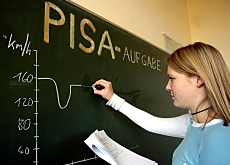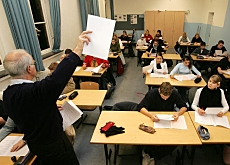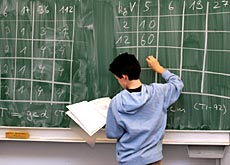Education system could do better

The Swiss education and training system often outperforms its European counterparts but rarely finishes top of the class, according to a report.
Switzerland is also the country in Europe where women are the least likely to complete a technical or scientific education, typically perceived as male preserves.
The report, published by the Federal Statistics Office, compared the Swiss situation with that in European Union countries. The criteria used were set out as part of the EU’s so-called Lisbon Strategy, whose aims include improving the quality of education and training by 2010.
Switzerland’s best result is the low number of students who decide against further education after compulsory schooling. With just 8.1 per cent, the Swiss education system does better than the ten per cent set out in the strategy, but still ranks behind Poland, the Czech Republic and Slovakia.
In the EU, nearly 16 per cent of young adults between the ages of 18 and 24 have chosen not to pursue their studies or some form of vocational training.
The Swiss don’t do as well when it comes to achieving some kind of higher school certificate. Less than 83 per cent finish with the equivalent of a baccalaureate or a trade qualification.
While the European average is slightly more than 75 per cent, the EU has set a benchmark of at least 85 per cent by 2010. Countries including Slovakia and Slovenia have already gone beyond this target.
The statistics office warns that it is unlikely that the Swiss will be able to reach the Lisbon mark by 2010, given that Switzerland’s result has not changed since 1996.
Reading skills
Reading remains a problem for the Swiss. The 2003 Pisa Report showed that 16.7 per cent of 15-year-olds lacked basic reading skills.
The EU, where nearly one in five teenagers has trouble reading, wants that figure to drop to below 15.5 per cent. But the average is already just under six per cent in Finland, and around six per cent in Ireland and the Netherlands.
The Swiss perform worst when it comes to encouraging women to study technical and scientific disciplines. With less than a 15-per-cent share of women earning diplomas in these fields, Switzerland is behind all the EU member countries.
In Europe, one in three such diplomas goes to a woman.
Even so, Swiss adults should have something to cheer about. They are far more likely to benefit from some form of additional training or education during their working careers.
With 28.6 per cent receiving extra education, they are only second to the Swedes. But the statistics office says that it is mainly highly qualified employees who benefit from additional training.
swissinfo with agencies
Just over 8% of young Swiss adults decide against further education after compulsory schooling.
83% of 20- to 24-year-olds have the equivalent of a baccalaureate.
Women make up less than 15% of those studying in technical and scientific fields in Switzerland.
In 2001, EU education ministers agreed as part of the Lisbon Strategy on three major goals to be achieved by 2010 for the benefit of the citizens and the Union as a whole.
The goals are to improve the quality and effectiveness of EU education and training systems; to ensure that they are accessible to all; to open up education and training to the wider world.
To monitor progress a series of five indicators and benchmarks were developed.

In compliance with the JTI standards
More: SWI swissinfo.ch certified by the Journalism Trust Initiative



You can find an overview of ongoing debates with our journalists here. Please join us!
If you want to start a conversation about a topic raised in this article or want to report factual errors, email us at english@swissinfo.ch.